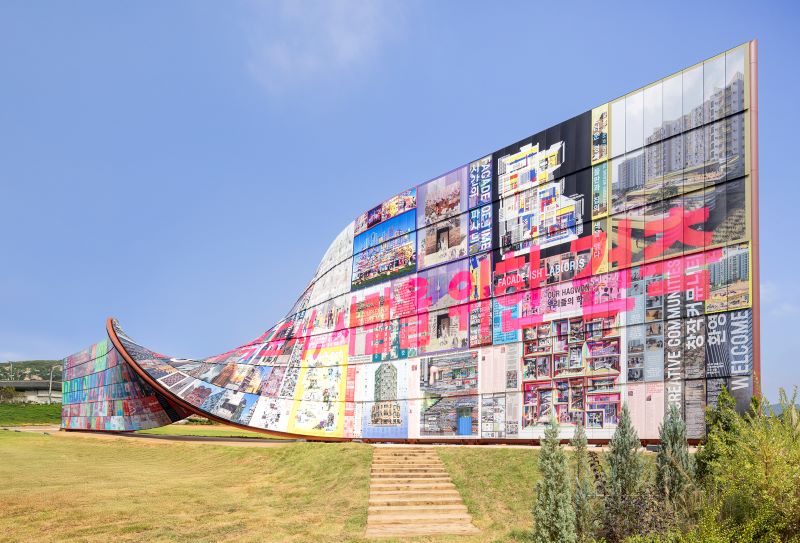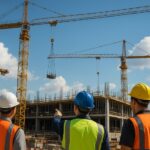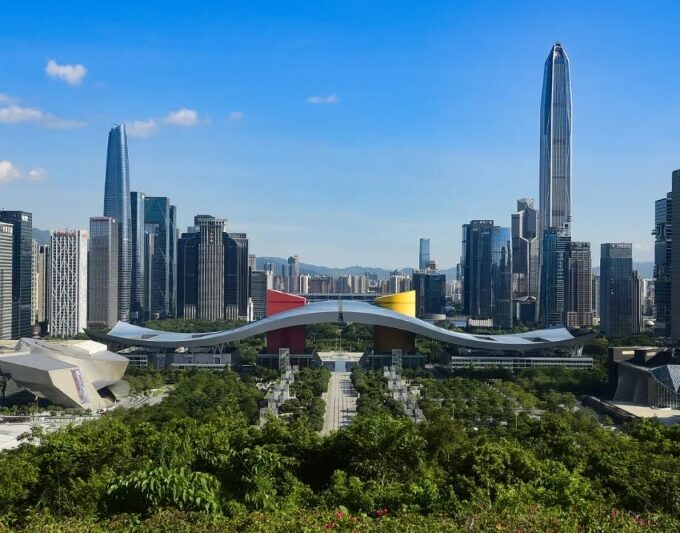The 5th Seoul Architecture and Urban Design Biennale opened on September 26 at Songhyeon Green Plaza in central Seoul. As Asia’s largest public architecture event, it is curated by Thomas Heatherwick, with the core theme “how to make cities more human-centric”. Running until November 18, it includes exhibitions, global forums and citizen-led projects to explore architecture’s role in building inclusive and sustainable urban environments.
Key Exhibition Highlights
A defining attraction of this year’s biennale is the “Human-Centric Wall,” a large-scale installation that merges art, architecture, and public participation. Stretching 90 meters in length and rising four stories high, the structure commands attention with its imposing yet approachable presence. It is constructed from 1,428 individual steel tiles, each engraved with perspectives from a wide spectrum of voices: ordinary citizens sharing their daily experiences of city life, scientists offering data-driven insights on urban sustainability, and designers contributing their visions for more livable spaces. Beyond its symbolic value, the wall serves as a repository of global ideas, bringing together 400 projects from 38 countries—each selected for its ability to reimagine urban living—crafted by 110 architects spanning different cultural and professional backgrounds. The wall’s winding shape forms a symbolic gateway, framing a collective declaration that urges visitors to adopt a new lens when viewing architecture and its impact on city life. As part of the open-air exhibition, it encourages visitors to interact deeply with the images and text.
Nearby, 24 “Public Life Walls” show large architectural fragments by international teams. Each fragment is 2.4 meters wide and 4.8 meters high, presenting diverse ways to rethink building exteriors. Creators include chefs, craftsmen, architects and engineers from South Korea, Burkina Faso, India, China, Japan, the US and the UK.

Opening Events and Supporting Exhibitions
The biennale’s opening had a ceremony hosted by Seoul Mayor Oh Se-hoon, followed by a two-day “Emotional City” forum. Over 400 activists, scholars and architects attended, and three “Humanize Campaign” research reports were released, exploring links between building exteriors, public health and social well-being.
Additional exhibitions are held at the Seoul Hall of Urbanism and Architecture. These include a grassroots project with over 500 Seoul citizens reflecting on architecture’s impact on emotions; “Emotionally Yours, Seoul” — a digital installation using public-submitted building exterior images and feelings; “The City’s Face” with 25 human-centric projects from 21 cities; and “From a Bird’s Eye to the Human Eye” highlighting 18 new works shaping Seoul’s future. This exhibition takes the latest experiential technology: it uses immersive models, virtual reality simulations, and first-person accounts from residents to show how these new buildings will feel to the people who live, work, or play in them.
Heatherwick Studio’s Asian Projects
While curating the biennale, Heatherwick Studio advances multiple Asian projects. In Seoul, it is the design partner for Yeouido Daegyo Apartments’ reconstruction — its first South Korean residential project. It was also selected to lead the redesign of Coex Convention and Exhibition Center, a key Seoul landmark.
Beyond South Korea, Heatherwick Studio has expanded its Asian portfolio with the launch of the Hatai project in Bangkok, Thailand—its first project in the country. The Hatai project is a mixed-use development that combines residential, commercial, and public spaces, designed to address Bangkok’s growing need for urban areas that balance functionality with quality of life. The development will feature green roofs, public plazas, and retail spaces that support local businesses, reflecting Heatherwick Studio’s commitment to creating spaces that serve both residents and the broader community.












